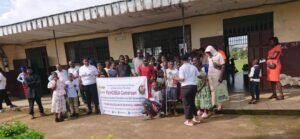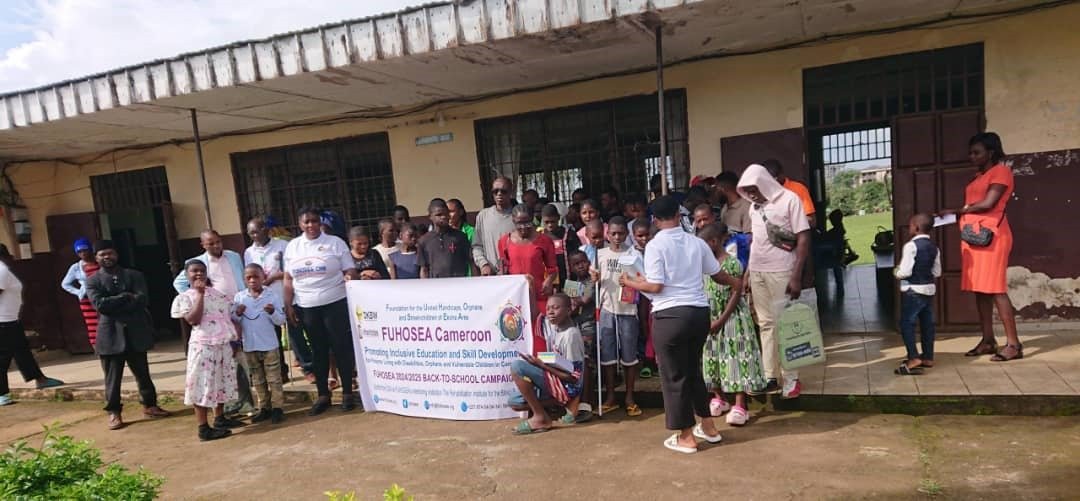By Princeley Njukang, Cameroon
All is set in the South West Region for schools to reopen on Monday, September 8, 2025. Ahead of the new academic year, the Ministry of Social Affairs (MINAS) has urged children and students living with disabilities (PWDS) to take full advantage of the school fee exoneration provided under the 2010 Law on the Protection and Promotion of Persons with Disabilities.
For officials at the regional delegations of Basic and Secondary Education, the goal this year is to surpass last year’s achievements in enrolment, curriculum coverage, and performance in national examinations. This means schools that had remained closed must reopen, allowing tens of thousands of children, including students with disabilities, to resume learning. United Nations statistics indicate that 40% of schools in the North West and South West have remained sealed since the start of the sociopolitical stalemate in 2017.
In recent weeks, videos circulated showing communities preparing school environments. Schools in Lebialem have been cleaned, benches repaired or replaced, and some schools relocated to buildings deemed safer by the community. During a meeting in Alou to prepare for the 2025 Presidential Election, Minister Paul Tassong emphasized that education is the only medium capable of guaranteeing the division’s development.
Similar calls have echoed across other divisions of the South West Region. “Education is the cornerstone of our society’s progress,” said Dr. Protus Arrey Tarkang during a ceremony organized by the Manyu Dynamic Club, recognizing last year’s top students. “By investing in youth education, we are investing in a brighter future for Manyu,” he added, highlighting the importance of ensuring that all children, including PWDS, benefit from schooling.
At the Secondary Education Sectorial Conference, Dr. Njie Martin Essongo, the new Regional Delegate of Secondary Education, highlighted the resilience of the region’s education system. Despite the ongoing crisis, South West performance in national exams has remained high. Dr. Essongo stressed that expanding access for students with disabilities will help consolidate the region’s position as a hub for educational excellence, underlining the critical link between school attendance and long-term development.
The 2025/2026 school year is further complicated by the October 12 Presidential Election, which the UN warns could heighten tensions. Yet, with sectorial conferences at both Basic and Secondary levels already held, Governor Bernard Okalia Bilai insisted: “Schools must begin on the 8th,” and so-called “Monday Ghost Towns” that have long impeded curriculum completion must cease. The Governor assured that measures are in place for a smooth resumption and urged teachers and students to attend from day one, noting that occupied schools are less likely to be targeted.
Parents navigating security and economic challenges described a tense and uncertain landscape. A mother from Alou said: “My children are excited to go to school. They even went with us to clear their school. But we are scared.” Some separatists favor reopening, others oppose it, insisting that only private and community schools—often a rebranding of government schools—should operate.
Economic strain also affects preparations. “You know how expensive things are in Buea. I’ve been trying my best to provide my children’s needs,” said Precious Nanga, a salesgirl. “I went to the market, and prices of books, bags, and other items have gone right up. I don’t know why the government would not subsidize these things.” The Ministry of Trade claims to have instituted price cuts for educational materials, though implementation remains inconsistent.
“For me, I will just monitor how Monday goes before deciding whether or not to send my children to school. I don’t want to lose a hair,” said Assong Mizpah, reflecting a recurring sentiment that prevents thousands of pupils from attending school.
For students with disabilities, the barriers are even greater. “When a new school year is about to start, we’re not excited like other students, because we know what’s coming are days of trials and tears,” says Elvira Nchenze, a visually impaired 17-year-old who sat for the Cameroon GCE Advanced Level last June. “It’s as if the system is set up to increase the challenges as we go up the academic ladder. We don’t have textbooks in braille, and when everyone else is reading theirs, I feel like an alien.”

Foundations such as FIEPWD and FUHOSEA are stepping in to provide specialized schoolbags, learning materials, and advocacy to ensure students with disabilities can access education with dignity. Despite these efforts, students like Elvira face systemic obstacles, including inaccessible infrastructure, poorly trained teachers, and social stigma.
The ongoing conflict in the North West and South West Regions compounds these challenges. Families struggle to pay school fees and provide for basic needs, while separatist activity has disrupted safe access to classrooms. These compounded difficulties mean that, without targeted interventions, children with disabilities risk being left behind entirely.
Yet optimism is returning. Communities have cleaned schools, authorities have reassured the public, and private groups continue to support students’ needs. The United Nations warns that keeping classrooms closed risks creating a “lost generation,” vulnerable to child labor, forced recruitment, and early marriage. Reopening schools is not just about lessons; it is about restoring stability, safeguarding futures, and ensuring every child—including those with disabilities—can learn and thrive.
“Before coming here, I put some staff in charge of admissions. I think we are ready to receive the children,” said Etta Samuel, Principal of GHS Akwaya. In the 2025 GCE, his school fielded four students in the Ordinary Level, achieving a 50% success rate. It was the first time the school had opened in nearly six years. “I’m sure this academic year, the population will increase compared to last year,” he added, underlining the hope that students of all abilities will be part of the return to classrooms.
Cameroonian Schools to Reopen Monday, Officials URGE PWDs to Take Advantage of Fee Exoneration
